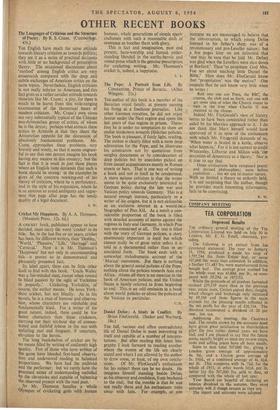THE English have much the same attitude towards literary criticism
as towards politics; they see it as a series of practical decisions with little or no background of prescriptive theory. The occasional discussions about 'method' among English critics are very amateurish compared with the deep and subtle exchanges of American critics on the same topics. Nevertheless, English criticism is not really inferior to American, and this fact gives us a rather cavalier attitude towards theorists like Mr. Crane; a pity, for there is much to be learnt from this wide-ranging examination of the theoretical bases of modern criticism. Mr. Crane's own views are very substantially typical of the Chicago neo-Aristotelian group of critics, of whom he is the doyen; perhaps what attracts these critics to Aristotle is that they share the Aristotelian appetite for the discussion of absolutely fundamental problems. Mr. Crane approaches these problems very bravely and wisely, so that it seems ungrate- ful to say that one cannot imagine his book having any success in this country; but the fact is that it is weak in just those places
where an English taste demands that such a book should be strong: in the examples he gives of the concrete working-out of his theory of criticism, where he is perfunctory, and in the style of his exposition, where he is so anxious to avoid ambiguity and vague- ness that page after page has the sandy quality of a legal document.


































 Previous page
Previous page